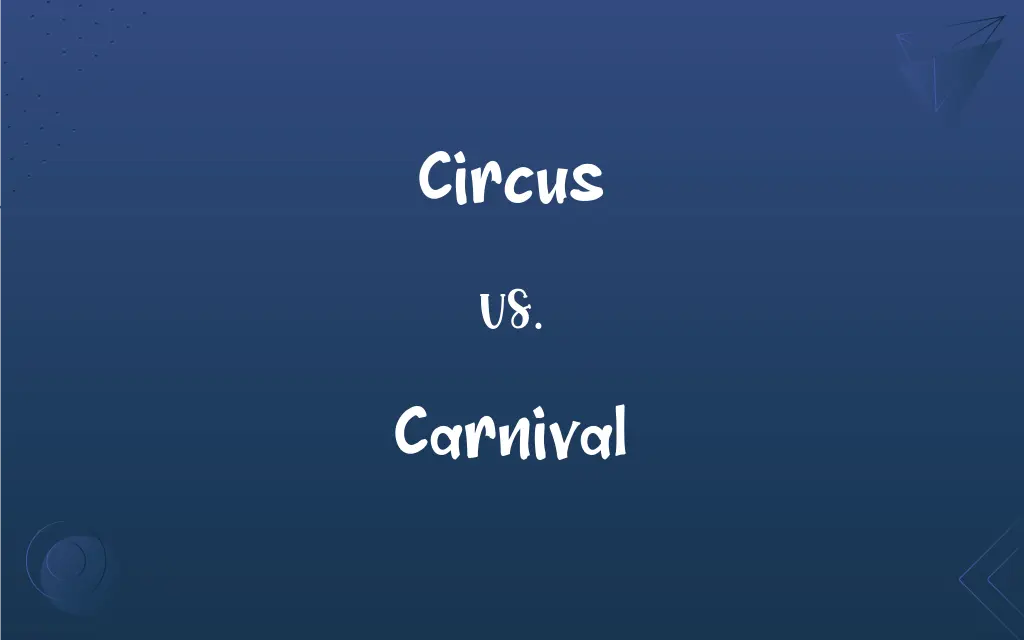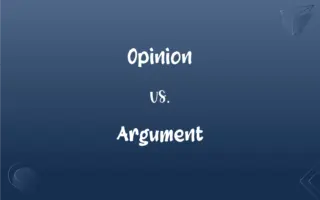Circus vs. Carnival: What's the Difference?
Edited by Aimie Carlson || By Harlon Moss || Updated on December 11, 2023
Circus is a traveling company of performers including acrobats, clowns, and trained animals. Carnival is a festive season with parades, music, dancing, and often rides and booths.

Key Differences
Circus and carnival, though often used interchangeably, have distinct characteristics. A circus is primarily a traveling show featuring acrobatic, animal, and clown performances in a ring or stage setting. Its roots trace back to ancient Roman times, evolving into the modern circus in the 18th century. In contrast, a carnival is a broader term encompassing traveling amusement shows, games, rides, and sometimes sideshow acts. Originating from medieval European religious festivals, carnivals have transformed into secular, community-wide celebrations often featuring a variety of entertainment and food stalls.
In terms of atmosphere and audience engagement, circuses and carnivals offer different experiences. The circus creates a magical, performance-focused environment where spectators watch skilled performers, like trapeze artists and lion tamers, in a structured show format. On the other hand, carnivals provide a more interactive and diverse experience, with attendees freely moving between various attractions, games, and food vendors, often in an open-air setting. This difference highlights the circus's focus on spectacle and skill, whereas the carnival emphasizes participation and variety.
The cultural and historical significance of circuses and carnivals also diverge. Circuses have played a vital role in entertainment history, introducing iconic figures like P.T. Barnum and evolving through innovations such as the modern circus tent. They have a storied tradition of training and showcasing rare talents, from acrobats to animal trainers. Carnivals, meanwhile, have a rich history tied to local traditions and seasonal festivals, often reflecting the cultural heritage of the community in which they take place. They serve as a gathering point for communities, blending entertainment with social interaction.
The economic models of circuses and carnivals differ significantly as well. Circuses typically rely on ticket sales for their meticulously planned and rehearsed shows, with performers often part of a professional troupe. This model emphasizes the quality and uniqueness of the performances. Conversely, carnivals often feature a collection of independent vendors, game booths, and ride operators, with revenue generated from a variety of sources including game participation, food sales, and ride tickets. This structure allows for a diverse range of attractions and a more decentralized organization.
The evolution and modern adaptation of circuses and carnivals reflect their distinct natures. Circuses have increasingly moved towards animal-free performances, focusing on human skills and artistic expression, partly in response to animal welfare concerns. This shift showcases the circus's ability to adapt while maintaining its core emphasis on performance art. Carnivals, in contrast, have expanded to include more technologically advanced rides and interactive games, adapting to modern entertainment trends while retaining their traditional role as a local festivity. Both continue to evolve, showcasing their unique contributions to the entertainment landscape.
ADVERTISEMENT
Comparison Chart
Type of Event
Entertainment show
Festive season
Main Attractions
Acrobats, clowns, animals
Parades, music, costumes
Venue
Tent or ring
Streets and public spaces
Audience Engagement
Spectators watching performances
Active participation in festivities
Cultural Role
Traveling entertainment
Celebration of cultural traditions
ADVERTISEMENT
Circus and Carnival Definitions
Circus
A company of performers showcasing acts like acrobatics, clowns, and trained animals.
The circus arrived in town, complete with acrobats swinging from trapezes.
Carnival
A public celebration featuring parades, costumes, and often rides.
For carnival, everyone wore elaborate costumes and joined the street parade.
Circus
A traveling entertainment show with a variety of performances in a ring or tent.
Every summer, a colorful circus sets up its big tent in the park.
Carnival
A festive period marked by parades, music, and public revelry.
The city streets came alive during the carnival, filled with music and dancers.
Circus
A large tent where circus performances are held.
The bright stripes of the circus tent stood out against the evening sky.
Carnival
A time of indulgence before a period of fasting or austerity.
Carnival was a time of feasting and dancing before the Lenten season.
Circus
A show featuring skilled acts like juggling, clowning, and animal training.
The circus's main attraction was a daring tightrope walker.
Carnival
A cultural festival often associated with religious or seasonal celebrations.
The carnival in Brazil is famous for its samba schools and vibrant costumes.
Circus
Performances that typically take place in a circular ring.
In the circus ring, a clown entertained the crowd with humorous antics.
Carnival
Events characterized by outdoor parties, music, and dancing.
The city's carnival culminated in a massive street party with live bands.
Circus
A public entertainment consisting typically of a variety of performances by acrobats, clowns, and often trained animals.
Carnival
Often Carnival The period of merrymaking and feasting celebrated just before Lent.
Circus
A traveling company that performs such entertainments.
Carnival
A traveling amusement show usually including rides, games, and sideshows.
Carnival
A festival or revel
Winter carnival.
Carnival
Any of a number of festivals held just before the beginning of Lent.
Carnival of Brazil
Venice Carnival
Carnival
A festive occasion marked by parades and sometimes special foods and other entertainment.
Carnival
(US) A traveling amusement park, called a funfair in British English.
We all got to ride the merry-go-round when they brought their carnival to town.
When the carnival came to town, every one wanted some cotton candy.
Carnival
A festival celebrated with merriment and revelry in Roman Gatholic countries during the week before Lent, esp. at Rome and Naples, during a few days (three to ten) before Lent, ending with Shrove Tuesday.
The carnival at Venice is everywhere talked of.
Carnival
Any merrymaking, feasting, or masquerading, especially when overstepping the bounds of decorum; a time of riotous excess.
He saw the lean dogs beneath the wallHold o'er the dead their carnival
Carnival
A festival marked by merrymaking and processions
Carnival
A frenetic disorganized (and often comic) disturbance suggestive of a circus or carnival;
It was so funny it was a circus
The whole occasion had a carnival atmosphere
Carnival
A traveling show; having sideshows and rides and games of skill etc.
FAQs
What is a carnival?
A festive season with public celebrations, parades, and music.
What is a circus?
A traveling show with acrobats, clowns, and animal acts.
What are common carnival activities?
Parades, costume dressing, and street parties.
Is a circus always traveling?
Traditionally, yes, but some circuses have permanent locations.
Where does a circus typically perform?
In a large tent or a permanent ring.
What is the origin of carnivals?
Rooted in medieval European religious and cultural traditions.
Do carnivals have a religious significance?
In many cases, yes, often tied to Christian traditions like Lent.
Can circuses be indoors?
Yes, especially modern circuses in permanent venues.
Do circuses involve audience participation?
Generally, no, as the audience watches the performances.
What kind of music is associated with circuses?
Upbeat, often instrumental music, like marches or waltzes.
Can circuses be modernized?
Yes, many modern circuses focus on artistic performances.
Are carnivals celebrated worldwide?
Yes, but they vary greatly in style and tradition.
Are circuses educational?
They can be, teaching about performance arts and animal care.
What is a circus clown?
A performer in a circus known for comedic acts.
Are animals a part of a carnival?
Not typically, as carnivals focus more on human festivities.
What is a carnival parade?
A public procession with music, costumes, and floats.
Do carnivals occur at a specific time of year?
Often before Lent or in summer, but it varies by region.
What foods are associated with carnivals?
Street foods, sweets, and festive treats.
What's the future of traditional circuses?
Many are evolving, focusing on human performances over animals.
Is carnival a public holiday?
In some places, it is, especially in countries like Brazil.
About Author
Written by
Harlon MossHarlon is a seasoned quality moderator and accomplished content writer for Difference Wiki. An alumnus of the prestigious University of California, he earned his degree in Computer Science. Leveraging his academic background, Harlon brings a meticulous and informed perspective to his work, ensuring content accuracy and excellence.
Edited by
Aimie CarlsonAimie Carlson, holding a master's degree in English literature, is a fervent English language enthusiast. She lends her writing talents to Difference Wiki, a prominent website that specializes in comparisons, offering readers insightful analyses that both captivate and inform.
































































